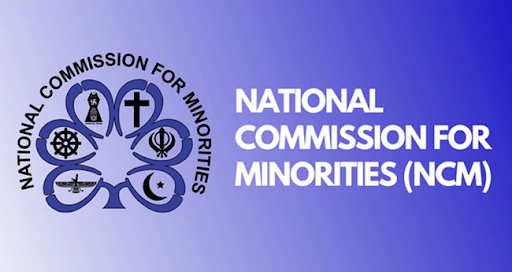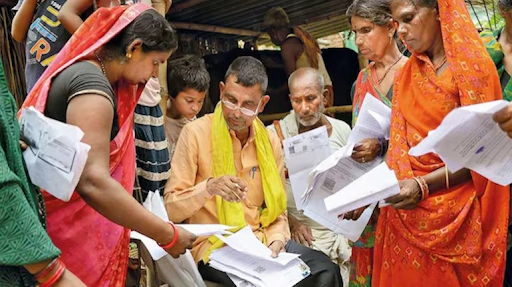



The Delhi High Court has directed the Central Government to respond to a PIL highlighting that all posts in the National Commission for Minorities (NCM) remain vacant. Stressing the NCM’s crucial role in protecting minority rights, the court urged the government to expedite appointments to ensure the commission functions effectively.

Copyright infringement not intended
Picture Courtesy: catholicconnect
The Delhi High Court highlighted that key posts (including chairperson) in the National Commission for Minorities (NCM) have remained vacant since April 2025.
|
Read all about: CONSTITUTION ON MINORITY RIGHTS l MINORITY RIGHTS IN INDIA l WELFARE SCHEMES FOR MINORITIES l MINORITY STATUS IN INDIA |
It is a statutory body established under National Commission for Minorities Act 1992, to monitor and evaluate the implementation of various constitutional and legal safeguards for minorities.
The Central Government officially notifies religious communities as minorities. Currently, six religious communities—Muslims, Christians, Sikhs, Buddhists, Zoroastrians (Parsis), and Jains—are officially recognized.
What is its Composition?
As defined by the NCM Act, 1992, the commission consists of:
The government nominates all seven members, who must be from the minority communities and should be individuals of eminence, ability, and integrity.
Each member holds office for a three-year term.
The NCM acts as both an advisory body and a quasi-judicial authority, tasked with safeguarding minority rights.
Functions:
Powers (Quasi-judicial Authority):
The NCM has been vested with the powers of a Civil Court during its investigations, enabling it to:
Grievance Redressal and Advocacy
The NCM acts as a vital platform for minorities to report discrimination, violence, or denial of rights.
Policy Influence
The Commission's recommendations influenced government policies like the Pradhan Mantri Jan Vikas Karyakram (PMJVK) to ensure equitable resource allocation for minority welfare and socio-economic development in Minority Concentration Areas (MCAs).
Promoting Communal Harmony
The NCM promotes interfaith dialogue and peace. Its timely interventions and statements during periods of communal tension serve as an important voice for reconciliation.
Generating Data and Insights
The NCM's annual reports offer valuable data and insights into the socio-economic status of minorities, highlighting areas that require increased government attention.
Lack of Constitutional Status
The NCM's recommendations are largely advisory and not legally binding on the government, unlike the National Commission for Scheduled Castes (NCSC) or National Commission for Scheduled Tribes (NCST), which have constitutional backing.
Limited Enforcement Powers
The NCM cannot punish offenders, enforce compliance from state governments, or directly influence policy without political will. It relies heavily on persuasion and its moral authority.
Vacancies and Underfunding
The Commission frequently has vacant Chairperson and Member positions, and insufficient resources hinder its ability to conduct investigations, research, and outreach across the nation.
Perceived Political Interference
Political influence, due to the Central Government's sole appointment power, compromises the Commission's independence and credibility.
Narrow Mandate
The NCM's mandate is restricted to six religious minorities, excluding other marginalized groups or linguistic minorities (who face distinct challenges) from its national purview.
Jurisdictional Overlaps
Its functions sometimes overlap with those of the National Human Rights Commission (NHRC) and other statutory commissions, which lead to redundancy and inter-agency coordination challenges.
Grant Constitutional Status
Granting constitutional recognition would empower NCM with the legal authority to ensure its recommendations are implemented.
The Parliamentary Standing Committee on Social Justice and Empowerment recommended granting constitutional status to the National Commission for Minorities (NCM)
Expand Jurisdiction and Powers
Amend the act to empower investigations into all rights violations, including those by security forces, with safeguards. Grant it power to penalize non-compliance.
Empower the NCM with more robust enforcement capabilities, including the ability to issue binding directives and impose penalties for non-cooperation by public authorities.
Ensure Transparent Appointments
Implement a transparent, collegium-based system for the appointment of the Chairperson and members to safeguard the Commission's independence and reduce the perception of political interference.
Adequate Resources
Ensure timely appointments of commissioners and provide sufficient financial and human resources, including dedicated research and legal teams, for comprehensive functioning.
Broaden the Mandate
Review the criteria for minority notification to include linguistic minorities or other marginalized groups facing similar issues of discrimination and disadvantage.
The T.M.A. Pai Foundation case (2002) judgment by the Supreme Court highlighted that minority status, both linguistic and religious communities, could be determined at the state level (not the country as a whole), providing a legal basis for a broader approach.
Promoting Synergy
Improve coordination mechanisms with other national commissions (NCSC, NCST, NHRC) and the Ministry of Minority Affairs to avoid redundancy and create a unified approach to addressing marginalized communities' issues.
Adopting International Best Practices
Countries like Canada have a Human Rights Commission with a broader mandate to investigate discrimination based on religion, race, etc., and its findings can be enforced through a tribunal. India could study such models to give the NCM more effective enforcement powers.
The National Commission for Minorities (NCM) is vital for protecting minority rights in India, but its impact is hindered by its non-statutory status and operational issues. To ensure India meets its human rights obligations, the NCM needs constitutional status, greater autonomy, and sufficient resources.
Source: THE HINDU
|
PRACTICE QUESTION Q. Discuss the constitutional and legal framework for the protection of minorities in India. 150 words |
The NCM is a statutory body established under the National Commission for Minorities Act of 1992 to protect and promote the interests of India's notified minority communities.
At the national level, the Indian government recognizes six religious communities as minorities: Muslims, Christians, Sikhs, Buddhists, Jains, and Zoroastrians (Parsis). The Constitution also recognizes and protects linguistic minorities.
Minorities in India are provided with several constitutional rights, including the protection of their distinct language, script, or culture under Article 29. Article 30 grants religious and linguistic minorities the right to establish and administer educational institutions, while Article 15 prohibits discrimination based on factors such as religion or race.




© 2026 iasgyan. All right reserved